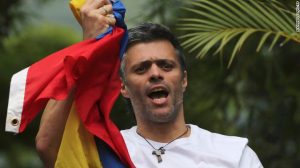By: Melissa Salamo and Chelsey Gould
Imagine a place with Caribbean-like beaches, beautiful lagoons, caves, parts of the Amazon Rainforest, tropical grassland, stunning prairies, the world’s highest waterfall and many other wonders. This place sounds like paradise… but ironically, today this country is Venezuela, a place that most people believe to be a dystopia.
Since the current political model called “socialism of the 21st century” was implemented in 1999, more than two million Venezuelans have left their country, El Pais reports. This marks the largest amount of people to migrate in the country’s history. The most popular destination for Venezuelans right now is the United States, or Venezuela’s mother country, Spain. However, over the years Canada has seen a significant increase of people from Venezuela as well.
“One of my favourite things is the warmth of our culture,” Daniel Garcia, a Venezuelan immigrant who moved to Canada 30 years ago, said. “In Canada most people don’t know their neighbours… never have even said ‘Hi.’ In Venezuela you live in a place for one month and you already know your neighbour’s grandparents.”
Although Venezuela is proven to be the country with the biggest oil reserve and used to be the richest country in South America, people are fleeing from it because it has become almost impossible to live in. Food is scarce, its rate of inflation is the highest in the world, minimum wage is seven dollars and according to the World Economic Forum, Venezuela is ranked the sixth most dangerous country in the world.

In 2014, Venezuelans who disagreed with the political system participated in protests and as a result more than 40 people were killed. Leopoldo Lopez, an opposition leader, was imprisoned and sentenced for 14 years for “instigating violence and disorder.” Three years later, another round of protests started, this time resulting in a death toll of more than 150 people. Human Rights Watch America conducted a study in which they documented 88 cases of human rights violations and the “brutality” of Venezuelan authorities. They said these cases did not represent all Venezuelan authorities, but were enough to draw conclusions.
“There hasn’t been justice for the people that sacrificed their lives in protests. For that 17-year-old that got shot in the face. It’s disgusting,” Garcia said.
Earlier this year, the government announced they would impose a constituent assembly mainly because the opposition filled about 65 per cent of the official National Assembly. Nicolas Maduro, Chavez’s successor, stated that this would restore peace in the country.
Maria Gabriela Ayala, a 31-year-old woman, moved to Canada this summer and was part of the protests this year.
“People became more serious [as the protest progressed] and then you start hearing the sounds of tear gas bombs. Then people start running for their lives,” Ayala said.
The political model was first implemented by Hugo Chavez who remained in power for 14 years, until he passed away in 2013 from cancer. During his long term, Hugo Chavez was adored by a lot of the population for his social work, but throughout the years became despised. He looked up to Cuba’s communist political system and its leader, Fidel Castro. Chavez managed to change the constitution, lengthen presidential terms, expropriate private companies/businesses, replaced workers in the state oil company (PDVSA) with loyal supporters, closed down oppositional news networks and strengthened ties with Castro.

Rebecca Sarfatti, activist and one of the leaders of ‘Venezolanos Por la Vida Toronto,’ said that Venezuela’s situation is bizarre and inexplicable.
“The oil company is broken and we don’t have internal productions, so people don’t have anything to eat; aspirins, antibiotics … children are suffering from malnutrition.”
Today, 34 per cent of families are resorting to emergency strategies in order to have food in their stomachs. Basic products are scarce, very difficult to find and if they are available they are priced unrealistically for someone who is paid a minimum salary.
“The inflation is killing people. My mom is a senior and she can’t find medications,” Sarfatti said.
Similarly, Garcia states that his family back home is also struggling.
“They’re not able to find regular things like toilet paper, rice, milk – things that we as Canadians don’t even think about,” Garcia said. “There you need to think of, where can I find it, how much will it be, will I have enough.”
Ayala said she went through difficult times to find basic products in Venezuela as well.
“It was difficult for me not to be able to buy contraceptive pills, which is something basic,” said Ayala. “It was a threat to my health.”
With the hunger crisis, highest inflation, violence, political prisoners and a lack of freedom of expression, many news outlets and people are calling Maduro’s regime a dictatorship. Today Canada calls to cancel the national constituent assembly and release all political prisoners.
Infographic by: Lauren Davis


Leave a Reply